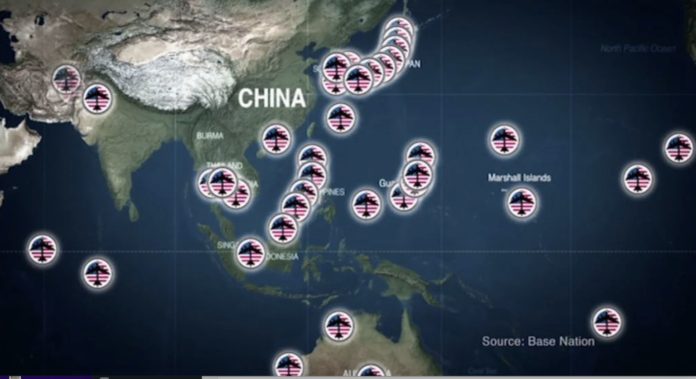Vanuatu Prime Minister loses ‘No Confidence’ motion, China sends police support
Recently, Vanuatu’s opposition party put a motion of ‘no confidence’ in the country’s Prime Minister, Ishmael Kalsakau. The vote was tight and legally challenged, forcing the Supreme Court of Vanuatu to rule on the issue. On Friday, 25 August the Supreme Court issued its decision, ruling that the ‘no confidence’ motion was won by the opposition, led by ex-Prime Minister Bob Loughman.
One issue cited in the motion is Vanuatu’s recent signing of a bi-lateral security agreement with Australia. Loughman claims that the security pact with Australia compromises Vanuatu’s neutrality and draws the nation further into Sino-American competition.
The Supreme Court’s ruling that Vanuatu’s government must step down takes effect on Monday 28 August, providing time for an appeal to be lodged. However, on Sunday 27 August, it was reported that Chinese police ‘experts and equipment’ arrived in Vanuatu. The deployment of Chinese police into Vanuatu will be of great concern to Australia and the United States, both nations are currently working hard to push back Chinese influence in Melanesia.
Vanuatu’s political issues should be noted by Pacific observers because they are indicative of larger trends, opposition leader Loughman was criticised during his tenure as Prime Minister for being to close to China. And; this raises questions about the amount of influence China has in Vanuatu’s politics. Further, the rapid deployment of Chinese police to Vanuatu demonstrates China’s willingness to intervene in Melanesia and should be noted by all Pacific nations.
History tells us, that whenever a large power sends its forces to support a small nation’s government it often takes a long time for them to go home. Vanuatu is a relatively unstable nation and now that China has a physical presence in the nation its political influence will increase.
Vanuatu is important because of its strategic location roughly in the centre of Solomon Islands, Fiji and New Caledonia. Solomon Islands is about 600km north-east, Fiji about 900km due east and New Caledonia about 600km south-east. Vanuatu is about 2000km from Brisbane and if China bases military forces there and in Solomon Islands it would pose a significant threat to Australian maritime trade in the Coral Sea. Access to these islands also provides opportunities for long-term intelligence gathering both undersea information (a possible counter to the new AUKUS submarines), signals intelligence and surveillance of sea and air space.
China’s rapid deployment of police into Vanuatu also raises questions about Solomon Islands. Another nation in which political disputes between pro and anti-Chinese political factions exist and are heightened by an election scheduled later this year. Solomon Islands has a history of political violence so it is easy to see scenarios in which China could take similar action in that nation.
Vanuatu may also be an example of a form of hybrid warfare known as ‘legal warfare’ or using a legitimate legal decision to justify deployment of pseudo-military forces; like police. This secures an area that may be useful in a future conflict. However, the key point is not about China but about how the influence of foreign powers is clearly starting to change the political dynamics of Melanesia. A trend that unfortunately is likely to spread further into the Pacific and that nations need to be aware of, and be ready to counter.
Melanesian Spearhead Group meeting – Update
Last week’s Melanesia Spearhead Group meeting in Vanuatu, included the group signing a joint regional security declaration that will be released publicly soon. However, statements made by Sitiveni Rabuka, Fijian Prime Minister on 25 August provide an insight into the meeting’s key discussion points.
Rabuka, said discussion at the meeting focussed on Sino-American rivalry and its effect on the region, stating that the major powers “are trying to polarise the Pacific into their own camps” and reinforcing the need for Pacific nations to choose their own path; and remain focussed on maintaining peace in the region.
China and Australia were both invited to the forum and sent delegations.
The issue of West Papua’s independence movement (the United Liberation Movement of West Papua) being represented in the Melanesia Spearhead Group was discussed and deferred to the Pacific Islands Forum for a decision. An unsurprising turn of events, Indonesia who currently controls West Papua or Irian Jaya (the Indonesia name for the region) is a very powerful nation and has considerable influence in the area. Papua New Guinea’s Prime Minister, James Marape made clear before the meeting that he did not support West Papuan representation on the forum.
In my opinion, the most important observations relate to the increasing leadership of Fiji in Pacific security matters. Rabuka appears to be developing as a statesman in the region. Last week, while he was in Port Villa, his Chief of Defence Force was co-hosting the Indo-Pacific Chiefs of Defence Force Conference in Fiji, an opportunity that significantly raises this small nation’s profile. Rabuka’s commentary and call for the Pacific to take control of its future in the face of Sino-American competition is important because it highlights the opportunity for small Pacific nations to work collectively to manage pressure from both the United States and China and maintain a peaceful region.
It is a fact that Sino-American competition is changing the dynamics of Pacific politics. A change that is unlikely to benefit the small nations of the Pacific and that can only be influenced by the region’s nations working together to mitigate the impacts. In the 1970s New Zealand played a similar role bringing together smaller nations in their opposition to French nuclear testing. In this era, it seems that Fiji is starting to fulfil a similar role.
Tonga – Another motion of ‘no confidence’ in a Pacific government!
Another small Pacific nation with political issues is Tonga, where late last week a ‘no confidence’ motion was lodged against the government by a group of MPs.
At the time this post was written there were few details available about the substance of the ‘no confidence’ motion.
Regardless, this activity is worth watching because if the motion ends up being about foreign policy; like Vanuatu’s it will be of concern. Further, the use of these processes and their success demonstrates the political instability of many small Pacific nations.
Fukushima waste water discharge – The Pacific protests!
Japan’s decision to discharge very diluted but still contaminated water from the Fukushima nuclear accident into the Pacific Ocean is raising protests across the region. This situation is an interesting example of how cultural differences impact on geo-political issues. The United Nations nuclear regulator, the International Atomic Energy Agency has reviewed the plan and deems it safe. However, in recent weeks, the following protests have been made in the Pacific:
- The Melanesian Spearhead Group’s meeting in Vanuatu issued a statement protesting Japan’s plan.
- This group’s parent body the Pacific Island Forum protested. Secretary General, Henry Puna issuing a statement that the forum and civil society will hold Japan accountable for any ill effects.
- Small Pacific nations including Niue have protested, and a string of public protests occurred across the Pacific from South Korea to New Zealand.
- China has protested to Japan and banned Japanese seafood.
The anger of small Pacific nations can be hard for people outside the Pacific to understand and from a security perspective provides useful lessons. The Pacific has a long history of being taken for granted by major powers. Many nations were colonised and after World War Two the Pacific was used for nuclear tests by the United Kingdom, United States and France. French nuclear testing at Muroroa Atoll included atmospheric tests until 1974 and underground test until the 1990s.
Nuclear testing had significant impacts, with people in some places being forcibly removed from their homes and receiving unsafe exposures to radioactive fallout. Rongelap Atoll in the Marshall Islands is a good case study. When American nuclear testing started the population was forcibly evacuated from the island, then allowed to return after the test programme finished and the island was declared ‘safe’ in 1957.
In 1985, after suffering high rates of leukaemia, birth defects and other cancers the Rongelap islanders were evacuated by Greenpeace. The United States government having refused to evacuate them and claiming the islands were safe. It is a sad story and one that is well-remembered in the Pacific.
Many Pacific cultures view the health of the ocean as intrinsic to the health of people, Japan’s actions demonstrate a lack of understanding of the Pacific’s history and an unwillingness to accept other cultural perspectives.
The United States, its allies and China are competing for the trust of small Pacific nations; and understanding the history of the Pacific and its peoples seems to be an important part of winning trust. So, it is interesting that China is the only major power that has protested Japan’s plan. Perhaps there is a lesson for the United States in China’s protest. Although we can argue that China’s protest is a cynically motivated political statement, it may be seen differently by Pacific audiences whose concerns about the Pacific’s atomic history have been minimised in the United States. Perhaps if the United States and its allies are seeking to compete with China in the Pacific understanding history and indigenous cultures of the Pacific is a pre-requisite for success.
Ben Morgan is a bored Gen Xer and TDBs military blogger




“History tells us, that whenever a large power sends its forces to support a small nation’s government it often takes a long time for them to go home.” heh no shit…the Yoo Ess Ayy knows a bit about that…
Mr Morgan’s position is unstintingly pro US, and 5 Eyes generally, Pacific Imperialism.
I will give Ben a credit however for mentioning the gruesome history of Nuclear Testing in the Pacific.
Whereas, you gain no credit for being an apologist for Russian and Chinese imperialism.
Come on, what Chinese or Russian Imperialism? Does China have 800 Military Bases around the Globe in over 150 Countries? NO, but the US does! Why? Because its called the US EMPIRE!
“Does China have 800 Military Bases around the Globe in over 150 Countries? NO, but the US does!” Antforce62
So what?
Before WWII the German imperialists had no overseas military bases at all. But they wanted them. Nobody could argue that Nazi Germany wasn’t an imperialist power.
Sure Russia and China don’t have as many overseas military bases around the globe as the US, but they do have them.
You can’t deny that fact.
How many overseas military bases one imperialist power has, compared to another imperialist power is not a measure of whether a country is imperialist.
There is no such thing as being a little bit imperialist, you are either imperialist or you are not.
https://en.wikipedia.org/wiki/List_of_Russian_military_bases_abroad
https://foreignpolicy.com/2023/07/27/china-military-naval-bases-plan-infrastructure/
I feel that you are being unfair to describe Ben as “unstintingly pro US, and 5 Eyes generally, Pacific Imperialism” as he does show some balance in his views. As you say he described nuclear testing in the Pacific well.
Very true Tiger, Ben is tied at the hip with the USA.
Years ago I visited Vanuatu. It was fifth world, in real need of help from Pacific neighbours NZ and Australia. Like Samoa and Tonga we basically did as little as possible leaving the door open for China to walk in. This could all have been avoided.
Agree. Australia in particular–using island territories as internment camps and mineral extraction sites–and NZ–did not do nearly enough for Polynesia, Micronesia and Melanesia over many decades.
Industrial countries have contributed to the sea level rise that threatens many of thees small territories and it time for Australia and NZ to genuinely contribute rather than scramble about because Uncle Sam says so.
Market economies are not steady state, they are in growth or recession.
China is not supplying enforcement to Vanuatu because of Chinese concerns about policing in this Pacific Island nation. Aggressive territorial expansion is not a choice for growth economies, but an imperative. Expansion or contraction is the iron law of market economies. By fair means or foul, to avoid economic contraction, rising economic powers will try to stake their claim. By fair means or foul established economic powers will attempt to keep them out.
One way or another the US or Australia will try to force the Chinese enforcement agencies out of Vanuatu.
A clash is inevitable.
This coming conflict will not be in the interests of the people of Vanuatu or the people of the Pacific.
“Access to these islands also provides opportunities for long-term intelligence gathering both undersea information (a possible counter to the new AUKUS submarines), signals intelligence and surveillance of sea and air space.” Ben Morgan
In the coming Pacific war, Australia’s ridiculous nuclear submarine building program is likely to be obsolete before any submarines are even built. Military conflict in this region between the West and China is likely to see the nuclear reactors of these vessels littering the floor of the Pacific Ocean.
https://www.eurasiantimes.com/china-claims-discovering-game-changing-tech-to-detect/#:~:text=Researchers%20with%20the%20Chinese%20Academy,submarine%20from%20long%20distances%20away.
Chinese Scientists “Discover” Game-Changing Tech To Detect Stealthiest Submarines Bursting US Navy’s Bubble
I liked the section headed ‘Needs Work, Physics Too Complicated To Understand’ best
I’m sure they will sort it out in time for the war.
Meanwhile in Russia
https://www.youtube.com/watch?v=VQSw4xgitrg&ab_channel=Kanal13
https://www.youtube.com/watch?v=RVkAqegqlgg&ab_channel=SoulsPatrol